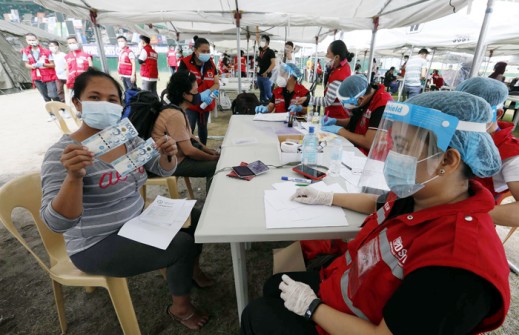HEADLINE: MANILA- Economy at its worst in 2020 – NEDA chief unfazed by 9.5% GDP fall, sees ‘encouraging’ moves

.
The economy shrank a record 9.5 percent last year, official data showed Thursday, after coronavirus measures devastated the retail and tourism sectors while a series of natural disasters wrecked crops.But Acting Socioeconomic Planning Secretary Karl Kendrick Chua said the outlook for this year was “encouraging” as measures introduced to contain the virus are eased further and the country prepares for a vaccination drive.“We will see more economic activity in the months ahead,” Chua said.“This will lead to a strong recovery before the end of the year when the government will have rolled out enough vaccines against COVID-19 for a majority of our people.”Gross domestic product shrank for four straight quarters in 2020, the Philippine Statistics Authority said.The full-year figure was the worst since records began in 1946 and ended more than two decades of annual growth.Accommodation and food services were among the sectors hardest hit by lockdowns and other measures that left millions jobless.
.

.
A series of typhoons and a volcanic eruption in the natural disaster-prone country also destroyed cash crops.Chua warned a more robust recovery was being hampered by stay-at-home orders for children, which were preventing families visiting shopping malls — the centers of community life and consumer spending in the Philippines.Earlier this week President Rodrigo Duterte overturned a decision by his coronavirus task force to lift the restriction on children aged 10 to 14.“Economic growth will be hard pressed to make a stronger recovery if children and families are restricted from participating in the economy as up to 50 percent of non-essential retail sales are driven by family spending,” Chua said.Once those and other measures are further relaxed, “we see no reason why the economy cannot bounce back”, he added.Last year “will be remembered as the most difficult year in our lives”, Chua said.

.“The road ahead remains challenging but there is now light at the end of the tunnel.”Gross domestic product (GDP) contracted 8.3 percent in the fourth quarter last year, bringing the full-year average to -9.5 percent, the worst since the end of World War II.National Statistician and Civil Registrar General Dennis Mapa said in an online press briefing that the 9.5-percent contraction surpassed the 7-percent decline posted in the latter part of the Marcos administration in 1984.The decline in GDP in 2020 was a reversal of the 6 percent expansion in 2019.Data showed that the fourth-quarter decline of 8.3 percent was n improvement from the deeper 11.4-percent contraction in the third quarter.Mapa said the agriculture sector declined by 2.5 percent in the fourth quarter and -0.2 percent for the full year.Industry also fell 9.9 percent in the fourth quarter, ending the year with an average -13.1 percent.Services, on the other hand, contracted by 8.4 percent in the fourth quarter and fell 9.1 percent the whole year.The 2020 GDP hit the upper end of the government’s earlier forecast range of a 8.5 to 9.5 percent contraction for the whole year. But it was below the International Monetary Fund’s -9.6 percent forecast for the year.Reading the joint statement of the Duterte administration’s economic managers, Chua said when the government restricted the economy in the second quarter of 2020, GDP fell by 16.9 percent and the unemployment rate rose to 17.7 percent.
However, improvements were seen with the gradual easing of restrictions. In the third quarter, a much slower GDP contraction of 11.4 percent was recorded. On a quarter-on-quarter basis, the economy even grew by 8 percent. Unemployment rate also dropped quickly to 8.7 percent.Chua said this improvement was the result of the further reopening of businesses and wider accessibility of public transport since October 2020. However, it also showed the limits of economic recovery without any major relaxation of our quarantine policy.“On the demand side, private consumption, which comprises some 70 percent of GDP, remained weak with a -7.2 percent growth. While the government relaxed the restrictions in the supply side by allowing more public transport and establishments to operate, restrictions on the demand side, notably on the mobility of children, and hence families, prevented private consumption from making a stronger comeback,” he said.
.

Consequently, he said the quarantine restrictions reduced household spending by P801 billion in 2020 or an average of around P2.2 billion per day. The fall in consumption translated into a total income loss of around P1.04 trillion in 2020 or an average of around P2.8 billion per day.On a per capita basis, annual family income declined by some P23,000 per worker, “but this average masks wide differences across sectors and jobs. Some workers were hit much harder, while others lost their jobs completely,” he said.Chua said agriculture performance deteriorated and contracted by 2.5 percent due to a series of typhoons, flooding, and the African swine flu. Six typhoons, namely typhoon Nika, Ofel, Pepito, Quinta, Rolly, and Ulysses, caused some P16.6 billion worth of losses and damage to agriculture. To prevent further spread of the disease, some 432,000 hogs were culled.

“Our experience in 2021 also shows that many Filipinos have learned to live with the virus, are complying with the minimum health standards, and are able to manage the risks in their personal lives. Nonetheless, we remain vigilant given the emergence of new COVID-19 variants,” he said.To improve confidence, Chua said the government has allocated P72.5 billion this year to provide vaccines to at least 50 million Filipinos.Chua said the speedy implementation of Bayanihan II, coupled with the extension of Bayanihan II to June 30, 2021 and the 2020 budget to Dec. 31, 2021 will allow the government to spend some P195.3 billion more in 2021. This translates to additional fiscal stimulus of about 1 percent of GDP in 2021.Malacañang on Thursday expressed optimism that the economy would rebound this year following its worst recession in 2020 due to the prolonged impact of the pandemic.Presidential spokesman Harry Roque said the reopening of more businesses amid the pandemic is key to the country’s economic recovery.

Senator Joel Villanueva said the 9.5 percent contraction in the full-year GDP should prod the government into accelerating the rollout of COVID-19 vaccines.“A vaccine is the powerful shot-in-the-arm that will inject consumer confidence into the economy and jolt it back to life,” Villanueva said.Also on Thursday, Camarines Sur Rep. Luis Raymund Villafuerte backed calls by the government’s economic managers for the immediate passage of measures aimed at attracting foreign investments to help speed up the economy that was battered by the COVID-19 lockdowns.Villafuerte at the same time expressed reservations on Charter change initiatives saying that such moves “would only sidetrack national efforts to overcome the Coronavirus pandemic and save sectors in distress.”In a statement Villafuerte said: “Now is the wrong time to pursue this politically sensitive and potentially divisive issue as it would only deflect national attention from the principal concerns of Covid-19 response and economic recovery.”“Amid the health and economic crises now sweeping across the globe, we should keep our focus on the COVID-19 vaccine program, which will be the only way of putting any semblance of normalcy back into our lives.
.

”Villafuerte said the nation’s focus should also remain at this point on accelerating economic recovery and regaining the economy’s pre-COVID growth momentum.He said he agreed with Finance Secretary Carlos Dominguez III who said at a Tuesday hearing of the House committee on constitutional amendments that the Congress can help speed up economic recovery by passing the proposed Corporate Recovery and Tax Incentives for Enterprises Act (CREATE) and the Government Financial Institutions Unified Initiatives to Distressed Enterprises for Economic Recovery (GUIDE) Act as stimulus packages.Dominguez said the approval of these measures should be complemented by the congressional passage of pending bills to make the economy more attractive to foreign investors, particularly the amendments to the Foreign Investment Act (FIA), Retail Trade Liberalization Act (RTLA) and the Public Service Act (PSA).Trade and Industry Secretary Ramon Lopez similarly batted for the passage of the proposed FIA, PSA and RTLA during the same House committee hearing.“These bills should be our doables this year in lieu of Cha-Cha,” Villafuerte said in expressing support for the swift congressional passage of CREATE and GUIDE along with the bills amending the FIA, RTLA and PSA to make the Philippines a more attractive hub for foreign investors. With AFP
posted January 29, 2021 at 01:30 am by Julito G. Rada and Macon Ramos-Araneta, Maricel V. Cruz
.












